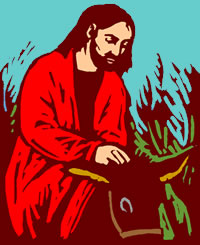
Passion (Palm) Sunday Year A
Today’s liturgy begins with the commemoration of the triumphant entry of Jesus into the holy city. This year we hear Matthew’s account. Its messianic emphasis is clear. The Master’s foreknowledge and authority are affirmed. A prophecy of Scripture (a combination of verses from Isaiah and Zechariah) is being fulfilled; but his coming is in humility and peacefulness. The people cry, ‘Hosanna to the Son of David’.
The first reading from Isaiah invites us to learn from the example of the Saviour, the trust we should have in our Father in heaven, whatever trials we face. But it is something else that makes this reading appropriate on the threshold of Holy Week – with God’s true Servant, we must be open to a new meeting with our God in what lies ahead - glad that the Lord ‘wakes us to hear, to listen like disciples’.
In the second reading, from the letter to the Philippians – echoing a hymn used in the liturgy of the first generation of the Church – Paul summarises with majestic brevity the drama of the Paschal Mystery we are about to celebrate: Jesus ‘emptied himself’, sharing our human condition, even to ‘accepting death on a cross’; and then, for our sake, he is ‘raised high’, one with the Father in the glory of the divine name.
Matthew’s account of the Lord’s passion has the features we have come to associate with this gospel. Faith in Jesus as the messiah has already been clearly affirmed in the description of his entry into Jerusalem; and the ultimate outcome is clearly anticipated: ‘After my resurrection, I shall go before you to Galilee’. But the subtlety with which Matthew’s account makes an affirmation of faith in the Saviour seems to indicate that he has his Jewish audience in mind. The refrain of fulfilment - as ‘the Son of Man goes to his fate’ - echoes through the narrative. The titles attributed to Jesus are few, ‘the Christ’, ‘Son of God’ and ‘Son of Man’. But they are crucial for converts from a Jewish background. The first raises the great issue that confronted the Jewish people. The title, ‘Son of God’ (which was to become an ultimate expression of the absolute claim of Christian faith) was open-ended to the ears of old Israel, indicating one who has God’s special favour. It was the title, ‘Son of Man’, crucial at the trial of Jesus, that removed all ambiguity. ‘You will see the Son of Man seated at the right hand of the Power (Yahweh himself)’, Jesus declares (referring to Psalm 110), ‘and coming on the clouds of heaven’, (a reference to Dan 7). ‘What need of witnesses have we now!’ exclaimed the high priest. The rending of the veil of the Temple and the apocalyptic events in the holy city, are a divine confirmation that, with the Lord’s death, the old order has given way to the new. And the centurion’s words, ‘In truth this was a son of God’, are an expression of the Church’s newfound faith.
The liturgies of Holy Week will teach us, not with fine oratory, but by recounting the great events in which the generous ways of God found a final expression in our human history. Let this recognition set the tone for our participation in the liturgies of these days.
John Thornhill sm

